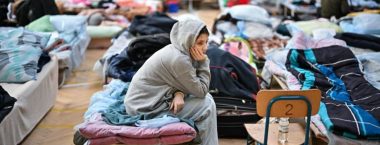
Torments, Torture Chambers, Executions: T4P Initiative Presents Two Submissions to the International Criminal Court
Information about extrajudicial executions of Ukrainians by the Russian military and Russian torture chambers in...
28 September 2023
UHHRU’s Strategic Litigation Center lawyer Alina Pavliuk on сaptivity in terms of criminal law of Ukraine
On March 27, 2018 the Parliament of Ukraine registered Draft Law 8205 On the Legal Status and Social Guarantees of Persons Illegally Deprived of Their Liberty, Hostages or Those Convicted in Temporarily Occupied Territories of Ukraine and beyond. In addition to the provisions on guarantees for “persons illegally deprived of their liberty in temporarily occupied territories of Ukraine or illegally convicted outside its borders“, I would like to bring up other provisions as well. Clause 4 of Article 1 of the bill states that “a person is considered a hostage or another kind of illegally detained person from the moment when he or she is recognized, in accordance with procedural law, as a victim of crimes provided for by Articles 146, 147, 349, 349-1 of the Criminal Code of Ukraine and until the moment said person is released“.
There are doubts not just about linking the issue of status to the norms of criminal law, but also regarding the case law of criminal proceedings under specified articles. I will try to sort out here application of these articles of the Criminal Code with respect to prisoners of war and civilian hostages.
It should be said first that this bill was supposed to strengthen the status of prisoners of war and civilian hostages in the context of international humanitarian law. With the adoption of the Law On Peculiarities of the State Policy on Ensuring the State Sovereignty of Ukraine in Temporarily Occupied Territories of Donetsk and Luhansk Oblasts, it was recognized at the legislative level that “armed aggression of the Russian Federation” is taking place in the east of Ukraine. Therefore, as much as government institutions are trying to talk about “mutual release of hostages” and “Ukrainian citizens illegally held by self-proclaimed republics”, it is time to bring the issue into the plane of international law and use the correct terms (the issue of the status of captives and its meaning was analyzed in one of the previous posts at /blogs/chomu-my-hovorymo-pro-status-polonenoho/).
References to the Criminal Code proposed by Draft Law 8205 provide for the following crimes: Art. 146 – Illegal deprivation of liberty or kidnapping of a person, Art. 147 – taking of hostages, Art. 349 – taking hostage of a government representative or a law enforcement officer, Art. 349-1 – taking hostage of a journalist. However, these proposals are fundamentally different from the case law of criminal proceedings currently carried out by law enforcement bodies in connection with capture/detention of persons (legal classification of criminal acts was investigated in the study Total Impunity in the ATO Zone: Investigation of Illegal Detentions and Slave Labor, text available at /wp-content/uploads/2016/10/2016-09-16__Brochure_Plen_ukr_210x297-1.pdf). I will just attempt a brief overview of the current situation.
Unauthorized absence from a military base
According to official statistics of the Office of the Prosecutor General of Ukraine, there were 3,188 instances of unauthorized absence from a military unit or place of service in 2017 (Article 407 of the Criminal Code), out of those 2,424 persons were notified of suspicion, and 2,173 cases were brought to court with an indictment. What am I getting at? There is a widespread practice, when a soldier is captured, to explain this by his having gone AWOL. This frees the soldier’s unit from the need to pay the prisoner of war during his captivity, and military command often abuses this norm without investigating the circumstances that led to the capture (this norm is established in clause 6, Art. 9 of the Law On Social and Legal Protection of Servicemen and their Families).
In accordance with the legislative acts that determine the procedure for keeping personnel records in military units, capture of a person leads to an internal investigation (general procedure and terms are determined by the Order of the Ministry of Defense On Approval of the Instruction on Keeping Personnel Records of the Armed Forces of Ukraine No. 333 of 26 May 2014, Instruction on Investigation and Records of Accidents, Occupational Diseases and Emergencies in the Armed Forces of Ukraine, approved by the Order of the Ministry of Defense No. 36 of 6 February 2001, Official Investigation Procedure in the Armed Forces of Ukraine, approved by the Order of the Minister of Defense No. 608 of 21 November 2017). Speaking about investigations of unauthorized absence from a military base, they are carried out to establish:
As for criminal proceedings, criminal investigations into unauthorized absence from a military base are opened by regional military prosecutor’s offices under Article 407 of the Criminal Code (unauthorized abandonment of a military unit or place of service). This practice was especially popular among military units, Military Law Enforcement Service of the Armed Forces of Ukraine and regional military prosecutor’s offices in 2016-2017. For instance, on March 24, 2016 one Taras Hapyak was captured. The next day “LPR” terrorists published a video on the Internet where Taras says that he surrendered of his own volition. After the video was released, his military unit accused him of voluntary surrender. This story was disproved only after his release on 27 December 2017.
It is difficult to make a general conclusion for all such cases that a soldier could not arbitrarily leave his position and surrender or go over to the enemy. The important thing here is that every capture should be objectively investigated before certain allegations against the captives can be made, since the presumption of innocence established by the Constitution of Ukraine is still in place.
Illegal deprivation of liberty
If we take a look at the statistics of the Prosecutor General’s Office for 2017, 503 offenses under Art. 146 of the Criminal Code were recorded by the National Police, only 3 under Art. 147, 2 offenses under Art. 349, and none under Art. 349-1. During the first quarter of 2018, there were 215 violations of Art. 146 and just one – of Art. 147, with none for the rest. This statistics on keeping the Unified State Register of Pretrial Investigations proves the inconsistency between the provision proposed in Draft Law 8205 and the actual state of affairs.
The general practice of the work of the National Police and the Main Military Prosecutor’s Office shows that, in case of capture, criminal proceedings are opened under Art. 146 of the Criminal Code – illegal deprivation of liberty. For the Main Military Prosecutor’s Office, this article is supplemented with another one – Art. 438 of the Criminal Code – violation of the laws and customs of the war in connection with cruel treatment toward prisoners of war or civilians. The emphasis in this definition is made on the deprivation of a person’s liberty, since it is Art. 146 that is considered primary here. Art. 438 serves as a supplemental article and only in the context of the legal classification of widespread use of torture and cruel treatment toward prisoners (legal classification of criminal acts was investigated in the study Total Impunity in the ATO Zone: Investigation of Illegal Detentions and Slave Labor, text available at /wp-content/uploads/2016/10/2016-09-16__Brochure_Plen_ukr_210x297-1.pdf).
Speaking of the overall context of the crimes committed, it is worth noting two main points:
Among these two extremes in the legal classification of criminal offenses with prisoners as persons of interest, there is no place for the concept of “hostage” or legal definitions under Articles 147, 349, 349-1 of the Criminal Code of Ukraine, as proposed in the text of Draft Law 8205. This situation demonstrates how distant the proposed solutions are from reality. Even conceptually, the four years of the work of the National Police on these proceedings have been unfruitful, and instead of changing the situation, legislative proposals only aim to reinforce the ineffective practices.
When it comes to the status of prisoners, rather than the terminology of criminal law, we should consider the perspective of international law, which is used by Ukraine in international courts and is confirmed in the latest adopted legislative acts. Thus, on March 20, 2018 the Parliament of Ukraine adopted the Resolution On the Package of Urgent Measures for the Practical Implementation of International Legal Responsibility of the Russian Federation for Armed Aggression against Ukraine, which once again emphasized international norms and commitments on security issues. In any case, Ukraine should change its approach to properly resolve the issue of the status of captives.
Prepared by Alina Pavliuk, lawyer of the UHHRU’s Strategic Litigation Center
If you find an error on our site, please select the incorrect text and press ctrl-enter.

Information about extrajudicial executions of Ukrainians by the Russian military and Russian torture chambers in...
28 September 2023

On June 6, 2023, the Southern Area Military Court of Rostov-na-Donu sentenced Mr.Bohdan Ziza, a...
08 June 2023

Since the beginning of the full-scale Russian invasion of Ukraine, about 150,000 civilians who fled...
17 October 2022
Taras Shevchenko National University of Kyiv and its student community in cooperation with leading Ukrainian...
13 September 2022